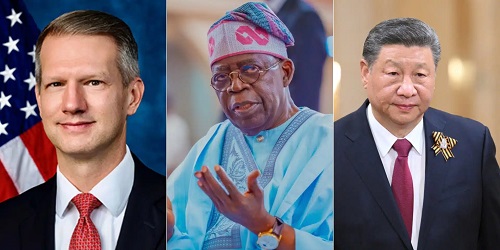INTERNATIONAL

US LAWMAKER BLASTS CHINA OVER COMMENTS ON NIGERIA’S SOVEREIGNTY
A member of the U.S. House of Representatives, Riley Moore, has sharply criticized China over its recent comments urging the United States not to interfere in Nigeria’s internal affairs.
The exchange came after former U.S. President Donald Trump warned of possible military action in Nigeria if the reported persecution of Christians in the country continues. In response, China’s foreign ministry spokesperson, Mao Ning, advised Washington to respect Nigeria’s sovereignty and avoid using religion or human rights as grounds for intervention.
China, which describes itself as Nigeria’s “strategic partner,” emphasized its commitment to non-interference, mutual respect, and peaceful coexistence in African relations.
However, Moore dismissed Beijing’s position as “unwarranted interference” in America’s foreign policy.
“President Trump is absolutely right to defend our brothers and sisters in Christ who are suffering horrific persecution and even martyrdom for their faith,” Moore said.
“China will not dictate our foreign policy to us. We will not be lectured by a communist autocracy that arrests Christian pastors and locks ethnic minorities in concentration camps.”
Moore’s remarks underscore the growing tension between Washington and Beijing, with both nations vying for influence across Africa. Under President Xi Jinping, China has expanded its footprint on the continent through trade, loans, and infrastructure projects, while the U.S. has faced challenges maintaining its traditional influence amid policy shifts and aid reductions.
Meanwhile, ECOWAS and the European Union have reaffirmed their support for Nigeria’s sovereignty and stability, calling on global partners to back regional efforts in combating terrorism and insecurity.
The latest diplomatic spat adds a new layer to the U.S.–China rivalry, highlighting their conflicting approaches to governance, religion, and foreign policy in Africa.
"This represents a significant development in our ongoing coverage of current events."— Editorial Board









